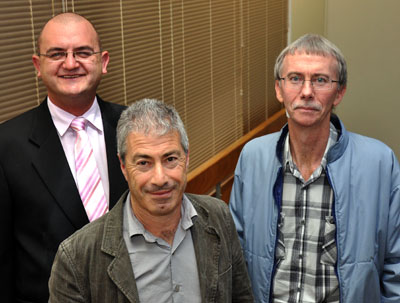Latest News Archive
Please select Category, Year, and then Month to display items
15 March 2022
|
Story Rulanzen Martin
|
Photo Supplied
 The keynote speakers are Dr Khabele Motlosa (right), Senior Lecturer in the Department of Political and Administrative Studies at NUL, and leading Pan-Africanist scholar Prof Molefi Kete Asante(left).
The keynote speakers are Dr Khabele Motlosa (right), Senior Lecturer in the Department of Political and Administrative Studies at NUL, and leading Pan-Africanist scholar Prof Molefi Kete Asante(left).
The
Centre for Gender and Africa Studies (CGAS) at the University of the Free State (UFS), together with the
National University of Lesotho (NUL) and the Academic Forum for Development of Lesotho, is hosting an online think tank on the transnational communities of the Lesotho-South Africa border from 19 to 21 March 2021. The theme of the conference is
Lesotho and South Africa: a clarion call for a Pan-Africanist future.
Dr Munyaradzi Mushonga, Programme Director: Africa Studies Programme in CGAS, is the convenor of the conference and is also leading the UFS borderlands panel. The borderlands project is jointly funded by the Office of the Dean: Faculty of the Humanities at the UFS, and the National Institute for the Humanities and Social Sciences (NIHSS).
For more information and to register for the conference, click here

Renowned historian visits Department of History
2012-05-30
 |
| With Prof. Saul Debow (middle) are (left) Dr Jan-Ad Stemmet, Senior Lecturer in the Department of History, and Prof. André Wessels, Head of the Department. |
Famed historian Prof. Saul Debow, from the University of Sussex, recently visited the Department of History. He gave a talk on South Africa's history of human rights. Prof. Debow, who studied at the Universities of Cape Town and Oxford, has published widely on the development of racial segregation and apartheid. His teaching and research concentrates mainly on the history of modern South Africa from the early nineteenth century to the present.